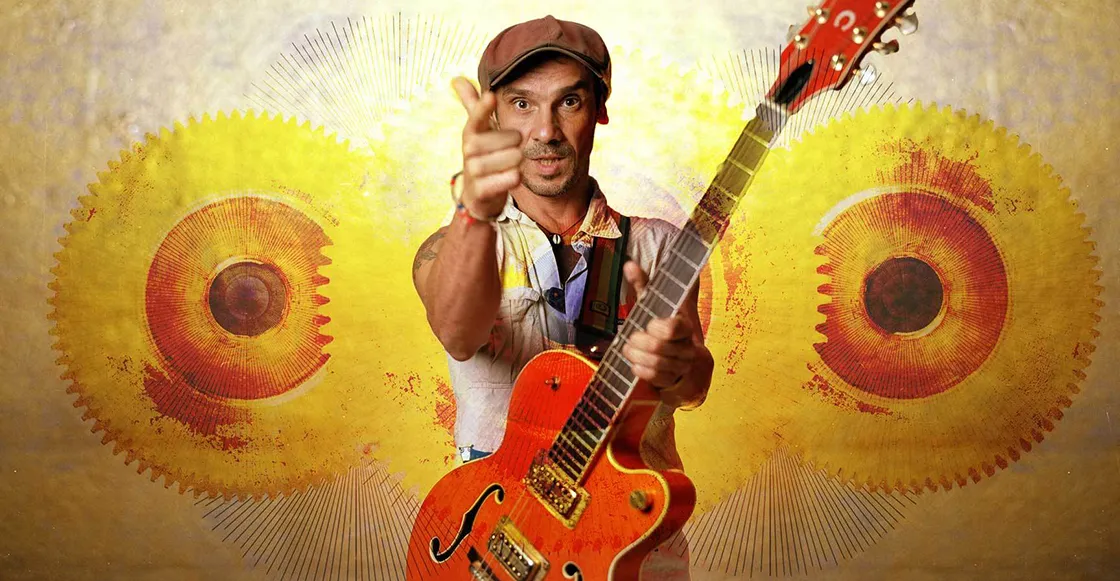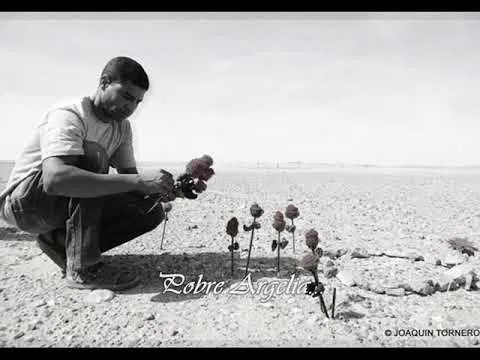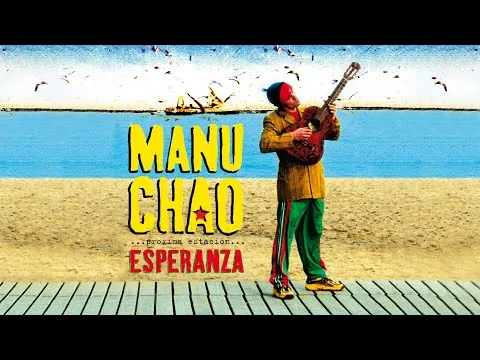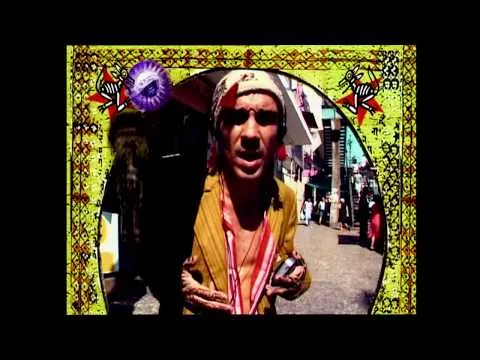The other day, as I was reading a post by @senorcoconut, I saw him mention a musician whom I count among my favorites, but haven't written a Monday Music post about him. Time to change that, primarily because his music is not only really awesome, but also because in spite of his fame in many circles, quite a few people I know have never even heard of him. The artist I'm talking about is Manu Chao.
A Crazy Mix of Cultures and Styles
I remember first hearing his music while hitchhiking through France in 1999 with a friend, when we got a ride from a British couple in their camper van. The tunes they had playing intrigued me, as it was super simple melodies, but with a very pleasant, contageous beat. The accompanying vocals were in at least four languages, English, French, Spanish, and Portuguese being the ones I recognized. It became thus the theme for our little trip, making us recall one or the other song, though we still didn't know the artist's name. Not much later I noticed some of these songs played in various settings at home. One of them, ironically the one I enjoyed least, even made it into the radio (for that reason I won't even link Bongo Bong here). As I learned, it was Manu Chao's debut album Clandestino.
It's not easy to describe his music, which on one hand tends to use very simple melodies, often recycled from other songs, but on the other hand packs them up in a very groovy, almost hypnotic beat. It sounds a lot like reggae, but has also many elements of Latin music, such as salsa and cumbia, as well as rock of course, and many other sounds I couldn't quite put my finger on. So I called Wikipedia for help, which lists such diverging styles, as French chanson, Algerian raï, rap, ska, samba, and flamenco as part of his repertoire.
All this is often interspersed by funny, weird, low-quality sounds, like the ones made by those key-chains that almost everyone in my generation had confiscated by a teacher in middle school. Additionally he likes to mix up his songs with various pieces of spoken text and other sounds from radio programs, so the overall experience is not unlike a chaotic taxi ride in Barcelona, Athens, Quito, or Guadalajara.
When it comes to languages, Manu Chao turns out to be even more diverse than I first assumed. Beside the four that I recognized, he also sings in Basque, Galician, Arabic, Italian, Greek, Wolof, and Catalan, among others, which he may switch within the same song. And true, the artist himself comes from a multicultural background (born to Basque and Galician parents, raised in France), which he has eagerly extended by traveling and forming intercultural relationships.
This use of multiple languages also means that the simplicity of each one offers itself perfectly for learning them. I remember Me Gustas Tu as the first song in Spanish I could follow and understand. Granted, it really is as simple as they come, but I was so happy when I had completed this baby step in learning Spanish. Others would follow soon. The same thing can be said about many of his English and French songs, which really don't take a lot to understand, so they're ideal for beginner level learners.
A Socially Conscious Message
Undeniably, such a mix of languages and styles will be highly appealing to those audiences, who share his passion of traveling, and getting to know other cultures. For this reason, his music has become ubiquitous with backpackers in hostels around this world. But listening to his words, may they be in English, French, Spanish, or something understood by only a few of us, one is bound to notice an additional layer: It's not only about party in this colorful world of ours. In fact, most people who travel don't do it for fun! One of his most famous songs emphasizing this is Clandestino, about migrant workers world wide.
Other social issues he likes to address in his music include economic inequality, forced disappearances, globalization, organized crime, food safety, political corruption, violent conflicts, mental health, environmental justice, decriminalization of drugs, education, rights of women, indigenous groups, sex-workers, migrants, and many others. For his inclusionary spirit, Manu Chao has been described as "one of the punkiest artists out there".
To get a good impression, I really suggest taking a careful listen to his music, because in spite of its simplicity it tends to go quite deep. The first time I noticed this was on my aforementioned hitching trip, where he sings this world go crazy, it's an emergency, addressing his late inspiration Bob Marley in his song Mr. Bobby.
Take a Look at the Previous Posts in my Monday Music Series:
The Sound of the Hungarian Zither
Obligatory Line-Dance at Mexican Parties - El Payaso del Rodeo
Floating Into the Night by Julee Cruise
Classic Canadiana - Stan Rogers
Party Like There's No Tomorrow, Cry Like Everything Is Lost - Hungarian Gypsy Music
The Harder Sound of the Middle Ages - Corvus Corax
The First Hip-Hop I Actually Liked - Things Fall Apart by The Roots
No Prophets in Their Own Land - Rodrigo y Gabriela
Beyond the Boundries of Styles and Genres - King Gizzard and the Lizard Wizard
Accordion-Rock You May Not Know (But Really Should) - Los Tabascos
Songs of the Mexican Revolution - La Adelita
Memorable Weirdness - What Do You Want A Japanese To Do Again?
Gloomy Sunday - The Hungarian Suicide Song
Party Tunes from the Wild East - The "Russendisko" Experience
Folk Songs from Your Home Village - Hungarian Regional Sound Archives
Polynesian Salt Water Music
Images Conjured up by Tom Waits' Music
In Country: Folks Songs of Americans in the Vietnam War
Somebody Tell Me - Translating a Hungarian Song Into [EN] and [SP]
Somebody Tell Me - first trial & live performance [HU] [SP] [EN]
Horst Wessel in Mexico
Playing for Change - Old Favorites Played Around the World
Soothing Tunes and Gentle Rhythms of Mali Music
What Is It About Music? [Ecotrain's Question of the Week]
Halász Judit, Memories from my Childhood
Discovering Rocksteady
The New Generation of Banda
Horrible Music From Hungary: Dáridó or Wedding Rock
[ENG - ESP] 3 Songs From My Youth / 3 Canciones De Mi Adolescencia
Surfer Tunes from the 60's: Dick Dale
Tiny Desk Concert with the Kronos Quartet
Ghymes, Palmetta, Deep Forest: The Love-Hate of Hungarian Crossover
Crossover Styles : Cooking With Many Ingredients
Shady Grove: My First Impression Leading up to Discovering The Grateful Dead
Endless Jams and Weird Imagery: The Grateful Dead
Ratatat: Electronic Hip-Hop Beats for Studying and More
Flogging Molly: Irish Music With That Extra Bite










